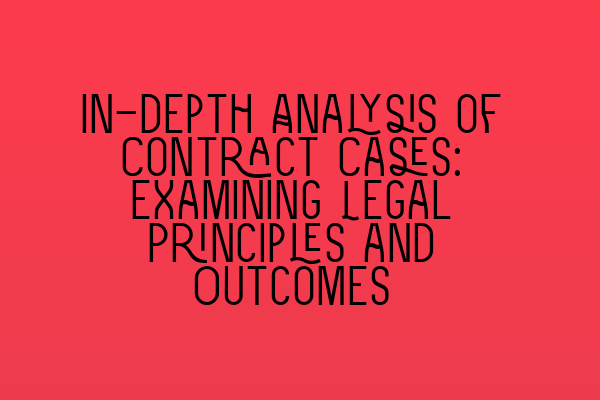**Title: In-depth Analysis of Contract Cases: Examining Legal Principles and Outcomes**
Introduction:
As contract law plays a pivotal role in the legal landscape, it is essential to have a thorough understanding of its intricacies. In this blog post, we will delve into the depths of contract cases, exploring the legal principles and outcomes associated with them. Our aim is to provide you with a comprehensive analysis that sheds light on the complexities of contract law.
1. Essential Elements of a Contract:
To commence our exploration, it is imperative to grasp the fundamental components that constitute a valid contract. These essential elements include:
a) Offer and Acceptance:
i) An offer is a clear, unequivocal expression of willingness to form a contract.
ii) Acceptance is the unambiguous agreement to the terms of the offer, which effectively creates a binding contract.
b) Consideration:
i) Consideration refers to the exchange of something of value between the parties involved.
ii) It ensures that both parties gain a benefit or suffer a detriment, thus creating a mutually binding agreement.
c) Intention to Create Legal Relations:
i) The parties must demonstrate an intention to be legally bound by the terms of the contract.
ii) This principle distinguishes legally enforceable agreements from social or domestic arrangements.
2. Breach of Contract:
When one party fails to fulfill their contractual obligations, it amounts to a breach of contract. Examining contract cases, we can categorize breaches into three main types:
a) Material Breach:
i) A material breach occurs when one party fails to perform a significant aspect of the contract.
ii) The non-breaching party can seek damages and, in some instances, terminate the contract.
b) Minor Breach:
i) A minor breach involves the non-performance of a less significant term of the contract.
ii) The non-breaching party is entitled to claim damages but cannot terminate the contract.
c) Anticipatory Breach:
i) An anticipatory breach arises when one party indicates an intention not to fulfill their contractual obligations before the agreed-upon time.
ii) The non-breaching party can terminate the contract and seek damages.
3. Remedies for Breach of Contract:
In contract cases, various remedies are available to the injured party following a breach. These remedies seek to restore the parties to the position they would have been in had the breach not occurred. The most common remedies include:
a) Damages:
i) Damages are awarded to compensate for any financial loss suffered due to the breach.
ii) The aim is to put the injured party in the position they would have been in had the contract been performed as agreed.
b) Specific Performance:
i) Specific performance is an equitable remedy where the court orders the breaching party to fulfill their obligations under the contract.
ii) This remedy is commonly sought when unique or rare properties are involved.
c) Rescission and Restitution:
i) Rescission allows the contract to be canceled, releasing the parties from their obligations.
ii) Restitution involves returning any benefits received under the contract.
4. Notable Contract Cases and Their Outcomes:
a) Carlill v. Carbolic Smoke Ball Company (1893):
i) This landmark case determined that an advertisement with a unilateral offer could create a binding contract when accepted by the offeree.
ii) The court held that the claimant was entitled to the promised reward as she had fulfilled the specified conditions.
b) Hadley v. Baxendale (1854):
i) This notable case established the principle of foreseeability in contract law.
ii) The court held that damages could only be awarded for losses that were reasonably foreseeable at the time the contract was made.
c) Fisher v. Bell (1960):
i) In this case, the court distinguished an offer from an invitation to treat in the context of a shop display.
ii) The court held that the display of goods in a shop window constituted an invitation to treat and not an offer.
5. Conclusion:
Contract law is a complex field that requires careful consideration of various legal principles and precedents. By analyzing contract cases, we gain insights into the nuances of contractual obligations, breach, and the available remedies. Building a strong foundation of knowledge in contract law empowers individuals and businesses to navigate the legal landscape with confidence.
